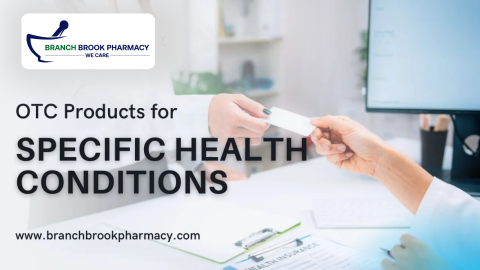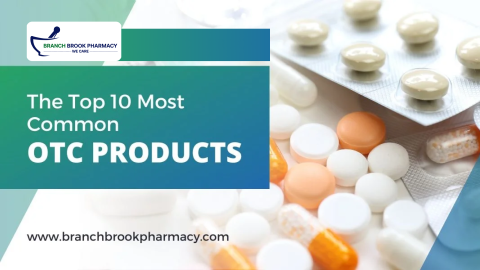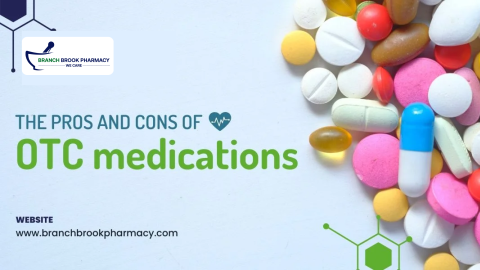
What is Over-The-Counter (OTC) medication?
Let’s take a look at A Beginner’s Guide to OTC Medications. Over-the-counter (OTC) medications are drugs that can be purchased without a prescription from a healthcare provider. These drugs are considered safe and effective for self-treatment of common conditions such as pain, fever, and allergies. They can be found in many forms, including pills, liquids, and creams, and are available at most pharmacies and retail stores.
Why Are OTC Medications Important?
OTC medications are a cornerstone of self-care. They empower individuals to manage minor health issues independently, saving time and reducing the need for frequent doctor visits. However, this convenience requires responsibility. Proper use of OTC medications, guided by reading labels and consulting healthcare providers when needed, ensures these accessible drugs remain safe and effective.
By understanding the benefits, differences, and safe usage of OTC medications, you can take charge of your health confidently. Whether you’re treating a headache, alleviating allergy symptoms, or managing a cold, OTC medications offer a reliable and convenient solution for everyday healthcare.
How does OTC Differ from Prescription Drugs?
OTC (over-the-counter) medications are drugs that can be purchased without a prescription from a healthcare provider, while prescription drugs are only available with a prescription from a healthcare provider. The main difference between OTC and prescription drugs is that OTC drugs are considered being safe and effective for self-treatment of common conditions such as pain, fever, and allergies, while prescription drugs are generally used to treat more serious or chronic conditions such as high blood pressure, diabetes, and cancer.
Another difference is the level of potency and potential side effects. OTC drugs are considered less potent and have fewer potential side effects than prescription drugs. This is because OTC drugs are formulated to treat common, self-limiting conditions, while prescription drugs are used to treat more serious or chronic conditions. Additionally, prescription drugs are typically more expensive than OTC medications because of the higher cost of development, testing, and regulatory approval.
How to Safely Use OTC?
When using OTC medications, it is important to read and follow the instructions on the label carefully. This includes the recommended dosage, possible side effects, and any warnings. It is also important to check for any interactions with other medications or supplements you may be taking.
When choosing a medication, it is also important to consider the active ingredient(s) because some active ingredients can have similar names but treat different conditions or potential side effects. For example, multiple active ingredients can treat allergy symptoms such as a runny nose and watery eyes, such as diphenhydramine and loratadine. Diphenhydramine is also an antihistamine but can cause drowsiness, while loratadine is a non-drowsy antihistamine.
To add further, some active ingredients may be combined in one medication to treat multiple symptoms at once. For example, a cold and flu medication may contain acetaminophen for pain relief, a decongestant for stuffy noses, and an antihistamine for a runny nose.
To avoid confusion and ensure that you choose the appropriate medication for your condition, it is important to carefully read the label and check the active ingredient(s) before making a purchase. If you are still determining which medication is appropriate for your condition or have any questions, consult a healthcare provider or a pharmacist.
Do We Risk Having Any Side Effects?
Taking over-the-counter medications can have a number of negative side effects, resulting in disadvantages. Side effects of different medications can vary from person to person; some people may be more sensitive to the side effects of certain medications than others.
Common side effects of OTC drugs include drowsiness, stomach upset, and allergic reactions. Drowsiness is a common side effect of antihistamines and some pain relievers and can impair your ability to drive or operate heavy machinery. Stomach upset is a common side effect of many medications, including pain relievers, and can cause symptoms such as nausea, vomiting, and diarrhoea. Allergic reactions can occur with any medication and range from mild symptoms, such as skin rash, to severe symptoms, such as difficulty breathing.
Conclusion :
To conclude, OTC medications can safely and effectively treat common conditions such as pain, fever, and allergies. They are widely available, easy to use, and less expensive than prescription drugs. However, it is important to use them responsibly by following the instructions on the label, considering the active ingredient(s) and the condition you are trying to treat, and being aware of the potential side effects.
It is also important to remember that OTC medications should not be used as a substitute for seeking medical attention when needed. If your symptoms persist or worsen or you have any concerns about your condition, consult a healthcare provider. A healthcare provider can help you determine the appropriate treatment for your condition and can also help you identify any potential interactions or contraindications with other medications or supplements you may be taking.
It is also important to know that OTC medications are not suitable for everyone. For example, people with certain medical conditions or who are taking certain medications may not be able to take certain OTC drugs. Therefore, it is important to always read the label, check the active ingredient and consult with a healthcare provider or pharmacist before taking any OTC medications.
In addition, it is important to remember that OTC drugs are intended for the self-treatment of minor conditions. If your symptoms persist or worsen or you have any concerns about your condition, consult a healthcare provider. By following these recommendations, you can use OTC medications safely and effectively to manage common conditions and improve your overall health.
Keep visiting https://branchbrookpharmacy.com/ to find out what’s new.




